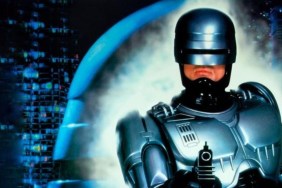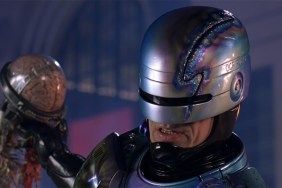
Alex Murphy (Joel Kinnaman) is a loving husband, father and good cop doing his best to stem the tide of crime and corruption in Detroit. After he is critically injured in the line of duty, OmniCorp utilizes their remarkable science of robotics to save Alex’s life. He returns to the streets of his beloved city with amazing new abilities, but with issues a regular man has never had to face before. Sam Jackson, Michael Keaton, Gary Oldman and Abbie Cornish star.
Shock Till You Drop: How is the viral campaign that’s taking place for the film reflect the movie?Jose
Padilha: Honestly, I haven’t seen it, but I can tell you about the movie. [laughs] First, I’m a massive fan of the original RoboCop. I wouldn’t try to do what they did. When I took this project, my idea was, what kind of inspiration I can get from it? It’s a much more sophisticated movie than people might realize, from a philosophical point of view. I look at RoboCop and I see – and you can see a little bit of it with the drones today – warfare is going to become mechanized. That will have consquences. You have a war with robots, you’re not losing men. Every single act of war can be traced to a human decision. There’s free will involved. When you replace those humans with robots that can make decisions, accountability goes out the window. You drop a robot in the middle of the forest and he’s hunting a drug dealer but kills a kid by accident. Who is to blame? This is a huge philosophical issue. RoboCop is about that.
Shock: Is RoboCop global or is it contained to the street of Detroit?
Padilha: Our movie has two dimensions. We’re in 2026. Wars all over the world are being fought with robots. In America, you’re not able to use robots for law enforcement because robots are not accountable. If that’s the case, some company that’s producing robots is losing a lot of money, how do you go around the law? You put a man in the machine because the man has a conscience. The reason RoboCop comes into being is because it raises a philosophical issues. It’s about being a man and being a robot. We made the choice of not taking RoboCop out of the picture. If you look at the original, Alex Murphy is blown to pieces and then when he comes back, he’s not there. What you don’t get is a man waking up and discovering his a robot. Because we’re talking about the difference between man and robot, we needed an intact human being waking up and thinking, what am I? What have I become? That makes the movie amazingly intimate. But it’s global in the sense that what’s going with this guy has a bearing on stuff like foreign policy. The Sam Jackson character makes it a bigger thing, a political thing, a foreign policy thing. We talk about media. We replaced the commercials with the media. here.
Shock: How does Kinnaman fill your needs there?
Padilha: It’s very difficult for an actor to play that transition between playing human and unhuman. Truly, this was performed by two actors because RoboCop’s created slowly – we spend a lot of time making him in this movie – and he’s created slowly by this scientist played by Gary Oldman. The playing out between robot and man happens between Oldman and Joel Kinnaman. Fortunately for me, they’re amazing. I sincerely think some of the sequences we have in this lab are performances you seldomly see in the movies.
Shock: What’s the percentage of the film devoted to RoboCop’s creation?
Padilha: Maybe 30%. You’ll see and understand how RoboCop is made from the inside. The idea is, you try to keep the man so he’s an accountable robot. His brain still have memories, emotions, all of the human part. The body is robot…
Shock: We’ve seen photos of RoboCop and he has a human hand…
Padilha: Because in a sense, the corporation has to sell the idea that this robot is still a man and can be accountable. How do I greet you as a man? You shake his right hand. There’s a marketing reason for it [in the world]. There’s also a whole commentary on marketing. When they’re building RoboCop, they’re thinking like they would sell a computer from Apple or something. They run focus groups to find out how he looks.
Shock: And the ED-209s? How big of a role do they play?
Padilha: They’re an iconic, huge, amazing construction in the first film. We have them, a lot of action scenes with ED-209s.
Stay up to date with the latest horror news by “liking” Shock Till You Drop’s Facebook page and following us on Twitter!









